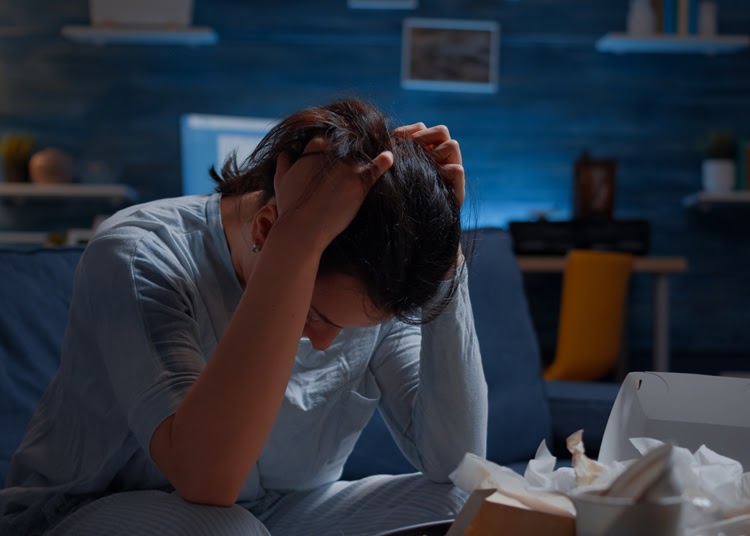Services
One of the major symptoms of bipolar disorder is mood swings. Do you sometimes feel like you are in a fairly normal mood that quickly evolves into extreme happiness and high energy? You might feel like you just want to keep going and never stop moving and doing things, even going without sleep. This sense of joy may be followed by a deep depressive state where you might struggle to finish the tasks you start or even get out of bed. If this sounds familiar to you, you may be suffering from bipolar disorder.
Bipolar disorder can be really frustrating for the people who are suffering from it. They may feel like they don’t have control of their own emotions. When they are having a manic (up) or depressive (down) episode, they may do things outside of their normal behavior, which can affect their interpersonal relationships. Bipolar disorder can also be stressful for the people in their life. Bipolar disorder may impact a person's ability to maintain intimate relationships, routines, and employment.
If you are suffering from bipolar disorder, you need to know that you are not alone. According to the National Institute of Mental Health, 2.8% of the adult U.S. population suffered from bipolar disorder during the years studied (2001-2003). And mental illness like this is no stranger to the Lone Star State. According to the Texas Health and Human Services Commission, more than 3.3 million Texans suffer from a mental illness.
If you are not sure whether or not you have bipolar disorder, you are in the right place. Doing this type of research helps you understand what bipolar disorder might look like for you. This is a great first step toward taking your behavioral health into your own hands, and we are always here to help you with that.
Bipolar disorder is a mental health condition that causes extreme changes in moods and emotions. These are not just normal mood swings or being easily affected by good or bad news. These swings in emotion may or may not be related to events in a person’s life and are often extreme. These changes in mood are noticeably different from the way a person typically acts and may make it difficult for them to maintain their usual routine during episodes.
People with bipolar I have a manic episode that lasts for at least one week or requires hospitalization. Depression or hypomania (a less intense manic episode that does not include psychosis, which is feeling, seeing, hearing, or believing things that are not real) may follow the manic episode, but not necessarily.
People with bipolar II have hypomania followed by a depressive episode. A manic episode may also occur. People with bipolar II may return to their normal level of functioning between episodes. Bipolar II is more common in women than in men.


People with cyclothymic disorder have symptoms of hypomania and depression over the course of two years where symptoms are present at least half the time. Symptoms of cyclothymic disorder are usually less intense than other forms of bipolar disorder.
People with this type of bipolar disorder show some symptoms of the above types of bipolar disorder but do not show enough symptoms of any one type to be diagnosed with a specific type. This can sometimes be more difficult to identify because it looks different from person to person.
The exact scientific causes of bipolar disorder are still not very well understood, but researchers believe it may be related to neurotransmitters (chemical messengers) in the brain and other brain activity.
Bipolar disorder is also closely linked to genetics (inborn traits passed down from generation to generation), and people with a biological family member who has bipolar disorder are at a higher risk of developing a bipolar disorder themselves.
Environmental factors can also play a part in the onset of the condition, like extreme stress or traumatic life events. Changes in sleep patterns, hormonal balance, substance use, medication, or significant changes in physical activity can also impact the onset of bipolar disorder.
Bipolar disorder can also be affected by things like seasonal or hormonal changes. For example, people with bipolar disorder can have worsening symptoms if they also have seasonal affective disorder. Some examples of hormonal changes may include menstrual cycles, pregnancy, or menopause in women.

Are you or a loved one suffering from bipolar disorder? It’s never too late to get started on managing your behavioral health. Find help today by calling 713-796-2273.
Not everyone with bipolar disorder will have identical symptoms. Symptoms vary between types of bipolar disorder. Even two people with the same type of bipolar disorder will not necessarily have the exact same symptoms.
The manic symptoms of bipolar disorder typically include:
The depressive symptoms of bipolar disorder typically include:
Bipolar disorder often shows up differently in men and women. For example, while men tend to show more symptoms of mania, women usually show more depressive symptoms of bipolar disorder. For this reason, women are diagnosed with bipolar II at a much higher rate than their male counterparts.
Women with bipolar disorder also have more emotional highs and lows around seasonal changes (like a form of seasonal affective disorder) than men with bipolar disorder have. In addition, while bipolar disorder in men can certainly be affected by hormonal changes in the body, women with bipolar disorder have predictable hormonal changes around menstruation, pregnancy, and postpartum that often affect their emotional state.


Hypomania and mania are very similar and have similar symptoms. The primary difference between mania and hypomania is the severity of symptoms. Someone with hypomania has much milder versions of the symptoms than someone with mania. Another key difference is that someone with mania may also experience psychosis (believing things that are not true or seeing, hearing, or feeling things that are not real), whereas psychosis is not a symptom of hypomania.
While hypomania is less severe than mania, the symptoms of hypomania are still noticeable. Someone with hypomania will still have excess energy beyond what is normal for them and several other symptoms associated with mania, just to a lesser extent. To the people in their lives, these symptoms will still be noticeable and will seem out of character.
If you’re looking to get treatment for your bipolar disorder, SUN Behavioral Houston might be a good fit for you. Here at SUN, we understand that every patient is different. That’s why we make sure that your treatment plan is made specifically to meet your needs.
SUN has a treatment program for everyone. We have specialized behavioral health services designed to treat everyone from young children to elderly adults. Our inpatient treatment options help patients who need lots of support recovering from their behavioral health issues, and our telehealth options allow patients to receive care from the comfort of their own home. There’s also outpatient treatments for those who need in-person care but can’t take too much time away from work and/or family duties. We have something for everyone.
SUN Behavioral Houston is located on the Texas Medical Center campus, which is one of the largest medical campuses in the world.
Therapy is usually an effective tool in treating bipolar disorder. We often use cognitive behavioral therapy, or CBT, to treat bipolar disorder. CBT is designed to help people identify harmful thoughts and behavioral patterns they have during manic or depressive episodes. Once that person learns to identify and understand the patterns, they can begin to manage the patterns during episodes to limit the negative impact they have on the person who is suffering.
CBT is commonly used to treat many behavioral health issues, ranging from substance use disorder to attention-deficit/hyperactivity disorder (ADHD). It is an effective tool that helps patients understand their own motivations and thoughts so that they can take control and reshape the way they go about their lives.
With CBT, the focus is on behavior. CBT helps you find ways to redirect your behaviors that often lead to or occur during episodes of bipolar disorder. By focusing on your behaviors and the motivations behind them, you can learn to alter that behavior, which will allow you to live a happy life where you are more in control.
Medication is typically an important part of managing bipolar disorder. The specific medication used usually depends on the individual. Medication used to treat bipolar disorder is most effective when used in combination with effective talk therapy.
A few common medications used to treat bipolar disorder include:
Different kinds of treatments work better for different people. No two people are exactly alike, even if they are suffering from the same behavioral health problems. The majority of people see the most success with some combination of talk therapy and medication.
The most common treatment for bipolar disorder is a combination of medication and talk therapy. The medication helps to stabilize the chemicals in a person’s brain, while the therapy helps them identify the thought and behavioral patterns they have during manic and depressive episodes in order to better manage the way they respond to them.
Bipolar disorder is usually a lifelong condition that does not completely go away. However, with the right combination of medication and therapy, many people are able to manage their symptoms and drastically improve their quality of life.
There are things you can do to help minimize your bipolar disorder symptoms, like regular exercise and a good diet. But in order to treat the disorder most effectively, it is important to receive professional treatment. While there is no cure for bipolar disorder, many people are able to drastically improve their quality of life with the right combination of medication and talk therapy.
The capable team at SUN Houston has been serving our community for years. Reach out to begin your journey to recovery.